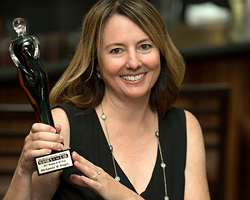MSU Clinic Teaches Students to Shepherd Children through the Courts

Delanie Pope, MSU assistant professor and attorney at the MSU Chance at Childhood Law and Social Work Clinic, was Michigan Lawyers Weekly's 2017 Woman of the Year for her work providing assistance and access to the court system for those unable to afford legal representation.
- Delanie Pope, Ph.D.
- Associate Professor, School of Criminal Justice
- College of Social Science
As Assistant Friend of the Court for Ingham County, Robert Hotchkiss sees firsthand how frustrating it can be for parents—especially low-income parents who can't afford an attorney—to navigate through the legal system. When custody concerns come before the court, the Friend of the Court helps the court determine what decisions are in the best interest of the children involved. There are, however, limits to what the office can do.
"The Friend of the Court cannot provide legal advice to our clients," Hotchkiss explained. "The MSU Chance at Childhood Law and Social Work Clinic helps our office directly. Their Self-Help Clinic and supervised parenting time program provide necessary services to our clients in the areas of legal guidance and supervising parenting time."
Delanie Pope is the staff attorney for the MSU Chance at Childhood Law and Social Work Clinic in East Lansing. In 2017, she was named "Woman of the Year" by the Michigan Lawyers Weekly. Joe Kozakiewicz is the program director, and Kim Battjes is the program coordinator.
"We try to advocate for children in the legal setting, and one way that we do that is by pairing teams of social work and law students," Pope explained. "We feel that we're preparing future professionals who understand both disciplines to better meet the needs of children and families. Children need legal advocates who have a holistic understanding of the problems that children face, not just somebody who knows the law, but somebody who also understands mental health issues, domestic violence issues, child development issues, educational issues, poverty issues, all those kinds of things."
The Chance at Childhood Clinic is a unique collaboration between the MSU Law College and the School of Social Work, bringing together future attorneys and social workers to learn how to achieve the best possible outcomes for children in the judicial system, all the while providing the community with a much-needed service.

The MSU Chance at Childhood Clinic provides students with hands-on experience in the daily work that they will encounter in child advocacy.
The program focuses on teaching students about pertinent issues, which allows the clinicians (as the students are called) to offer the court informed recommendations and to refer families to resources that will help in their particular circumstances. The student teams are assigned child welfare cases throughout the state of Michigan, primarily working in probate and family courts. Often, cases are assigned by the Friend of the Court.
The students become advocates for the children and families they work with, often testifying in court, making recommendations they feel best serve the interests of the children involved.
The Chance at Childhood Clinic also runs the aforementioned Self-Help Clinic.
"It's in collaboration with the Ingham County Friend of the Court and with the judges there," Pope said. "We started that in 2010. We basically help parents and kinship caregivers navigate the legal system. There are really a lot of folks who don't have access to the court system, or there are barriers to the court system. They might have limited English skills, or they might be illiterate, or they might not be able to afford legal representation, and so we help them learn what they need to do in order to access the court system."
The clinicians also assist with the Independent Supervised Parenting Time Program. The Ingham County Friend of the Court refers cases to the clinic, and students supervise while children spend time with a parent.
"This happens when a non-custodial parent has not seen a child for some time—maybe there's domestic violence or mental health issues," Pope said. "We provide the supervised parenting time so that child can see the parent. There is research out there that shows that children need those connections, and parents who play a role and get to see their child are more likely to pay their child support, which also directly benefits the child."
The goal is often to end supervised visitations as conditions improve. So students will report on these meetings and hopefully track improvement over time.
The student clinicians also visit children in their homes. For children under six who are in the care of a legal guardian, someone other than a parent, they will perform regular reviews to make sure children have what they need—meals, clothing, a bed to sleep in, etc. This helps the probate courts monitor the welfare of children who have not yet entered the school system, where neglect would presumably be noticed by teachers and school staff.
"In my ten years as Assistant Friend of the Court," Hotchkiss said, "we have had a close and productive relationship with the MSU Chance at Childhood Law and Social Work Clinic. They are always available and ready to help."
- Written by Matt Forster, University Outreach and Engagement
- Photograph courtesy of MSU Communications and Brand Strategy